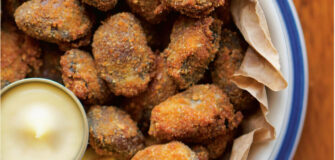Share
In her memoir Wine Witch on Fire: Rising from the Ashes of Divorce, Defamation, and Drinking Too Much, author Natalie MacLean offers readers a taste of sexist wine marketing. — Dundurn Press Ltd.
The message on some wine bottles is that women belong in one of two categories. We’re vixens drawn to brands like Little Black Dress and Kiss Me with their labels featuring short dresses, high heels, and red lips. Or we’re exhausted mothers buying wines such as Mommy Juice and Mommy’s Time Out to obliviate the stress of motherhood.
If we’re not babes, we’re battle-axes reaching for wine labels such as Mad Housewife, with taglines like “Award thyself,” “The dishes can wait,” and “Dinner be damned.” Antiquated societal beliefs about women had been turned into slogans. Should we be laughing or raging at jokes that demean women?
The marketing message is that women need a reason to drink, whether it’s girls’ night, a fancy occasion, or just getting through another day of exhaustion. It’s implied that we need permission to imbibe, as we do when we buy things. There’s even a wine for sneaky shopping called White Lie, with little lines stamped on the corks like “This old thing?” and “I got it on sale.”
We’re wallets, not women. We drink cutesy, crappy wines that subsidize the good stuff men drink. Wine was, and still is, the culturally accepted, modern-day Valium for women stressed out with our faces, bodies, spouses, kids, careers, and housework.
It’s all over Instagram. Vino is the ultimate soft filter to blunt all the feels. Don’t have time for meditation and yoga? Calm your central nervous system with this Cabernet. Wineries offer Vino Vinyasa yoga classes: detox then retox.
I had internalized the companion social media slogans:
“Mommy drinks wine because you cry.”
“Wine is to women as duct tape is to men — it fixes everything!”
“Well actually, it’s only mansplaining if it comes from the Mansplain region of France. Otherwise, it’s just sparkling misogyny.”
Wine is positioned as less candied and more sophisticated than the Cosmopolitans featured in Sex and the City. You can cloak your overindulgence with connoisseurship of artisanal, dry-farmed, old vine, natural wines in a way you could never do with that third Cosmo.
Several of my other favorite television shows, like Scandal, The Good Wife, Dead to Me, and Cougar Town, showcased professional women who rewarded themselves with a glass of wine, or three. Their oversized stemware reminded me of Virginia Slims cigarette ads from the 1960s, positioning them as torches of freedom for liberated women.
Conversely, wine is marketed to men as sophisticated and artisanal. No one asks a man why he wants a drink. He has one because he wants one. According to a ridiculous stereotype, Bordeaux wine bottles with their square shoulders remind French winemakers of their stout wives. The slender-sloped Burgundy bottles bring to mind their mistresses. Wink, wink.
I had always laughed off these narratives, just as I did with my boozy quips about drinking too much. Now the jokes fell flat. Both the wine labels targeting women and the labels we slap on women themselves profit from powerlessness. As a newly divorced “starter wife,” I had been painted onto another worn-out label.
Wine labels increasingly target women because we’re still mostly the ones who plan family meals and social get-togethers. We also still purchase most things for our households, including 80 percent of wine.
I wasn’t a bystander in the labeling game. I was team captain. In magazine articles, I had often described my glass of wine at 5:00 p.m. as “Mommy’s little helper.” That’s how I marketed wine to myself. It was also my way of fitting in with other “wine moms.” It sounded lighthearted, but it had the bitter edge of resentment. By that time of the day, I was exhausted. No one was helping Mommy, so Mommy helped herself — to a drink.
Even when nobody was asking me to plough through more email at the end of the day, I’d do it as long as I had my first glass of wine for the evening. I created my own reward to extend my productivity another hour. How does she do it all? With wine. But my sense of thankless depletion was never soothed by a drink. It dulled the roar, but not the whimper.
My culpability in these narratives has now become clear to me, but ten years ago I couldn’t see it. It’s hard to read a label from inside the bottle.
I raise my glass to those who break free from these stereotypes by designing their own labels. For more about Natalie’s books, online classes and wine reviews, visit www.nataliemaclean.com.



